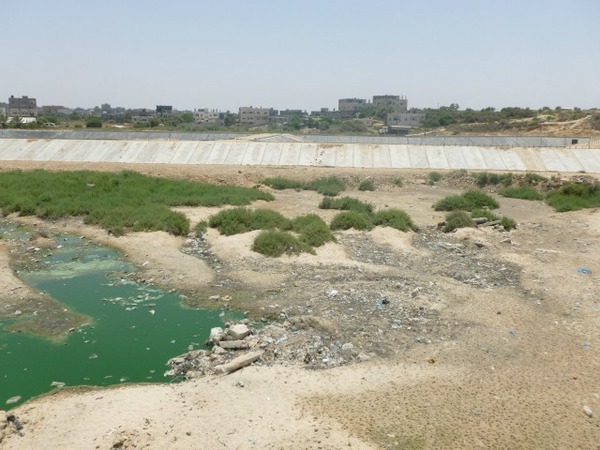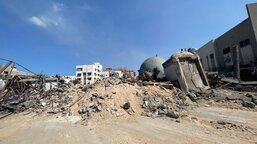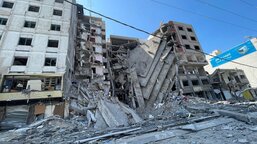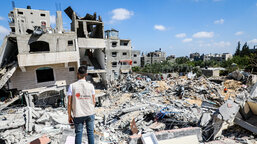"I walk more than a kilometre through a desert tunnel made of wires with automatic gates. Green light, we can go through. Red light, we wait. No one in sight, all visible signs of human presence seem to have disappeared. This place outside of time and space is called Erez: the border that connects Israel to Gaza and Gaza to Israel. A connecting line between two worlds," Rachel Felgines, working at Caritas Internationalis in the Middle East, described the situation in the Gaza Strip in 2016. Today, this crossing into Gaza is also closed. Moreover, the escalation of the conflict from 7th of October has worsened the humanitarian situation in Gaza.
The abnormal has become the norm
Gaza, a strip of isolated land smaller than Prague, is home to 2.3 million people. It is one of the most densely populated areas on the planet - and in a confined space. The Gaza Strip has been described as an “open-air prison“ that Palestinians are not allowed to leave except in “extremely rare cases“.
In 2015, Sister Bridget Tighe of the of the Franciscan Missionaries of the Divine Motherhood also visited the Gaza Strip and wrote a diary of her trip in which she writes: "In the quiet of my apartment, reflecting on this ordinary day at work, I felt that what I saw and experienced was a profoundly affecting example of life here, far from what people would consider normal: The proximity of the English cemetery to the bomb-damaged houses and the stark contrast between the splendor of the burial ground and its poverty-stricken surroundings; the squalor of the camp near the border compared to the sight of the beautiful blue waters of the Mediterranean; the resilience of the people despite the devastating poverty in which most of them live; the habituation to power cuts - women getting up during the night to do laundry and pump water into rooftop tanks; the desperation of young people who yearn to work and earn a living, but whose potential to contribute to the country's economy and rebuild it is thwarted; and the innocent children traumatized by war," describes Sister Bridget Tighe.
 In her diary, Sister Bridget describes how Caritas Jerusalem, which runs a medical centre on the ground, is helping in the Gaza Strip. The centre provides the usual services of a general practitioner, dentist, nurses as well as a pharmacist and psychologist. It also provides a mobile clinic.
In her diary, Sister Bridget describes how Caritas Jerusalem, which runs a medical centre on the ground, is helping in the Gaza Strip. The centre provides the usual services of a general practitioner, dentist, nurses as well as a pharmacist and psychologist. It also provides a mobile clinic.
"The needs of the people are so big that outside help is needed more than ever. On such a large scale, the abnormal is becoming the norm. Caritas Jerusalem has a major responsibility for the urgent needs of the most vulnerable, especially through medical and psychosocial care," writes Sister Bridget.
Due to the widespread and ongoing bombing by Israel in response to the Hamas attacks, Caritas Jerusalem has had to temporarily suspend its assistance. However, its staff still remain in the Gaza Strip and are ready to resume their medical services as soon as the security situation permits, providing assistance to injured and long-term sick residents.
"In the overall picture of urgent needs in Gaza, what Caritas Jerusalem is doing is relatively little, but until there is peace, open borders, freedom of movement, investment and development, the long-suffering people of Gaza will continue to need understanding, help and support. And I am grateful that Caritas here offers a way through which material aid flows from people around the world contributing to the poorest and most vulnerable," writes Sister Bridget.
The situation Sister Bridget described back in 2015 is not too different from the situation in Gaza today. On the contrary, the escalation of the conflict is dramatically worsening living conditions for the people of Gaza. They do not have access to electricity, water, fuel, food or medicine, which has greatly exacerbated the humanitarian crisis in the area. The vast majority of people in Gaza were already dependent on humanitarian aid before the conflict escalated.
In her diary, Sister Bridget describes the depressed population, the hopelessness, weakness and frustration of the people of Gaza. Years later, she writes:
"When we ask young Palestinians about their dreams for the future, about what they want, many say they have no dreams, no hope, that they live for today because they see no tomorrow. Highly skilled graduates work as waiters, construction workers, cleaners, just to earn a living," writes Sister Bridget Tighe in 2020.










